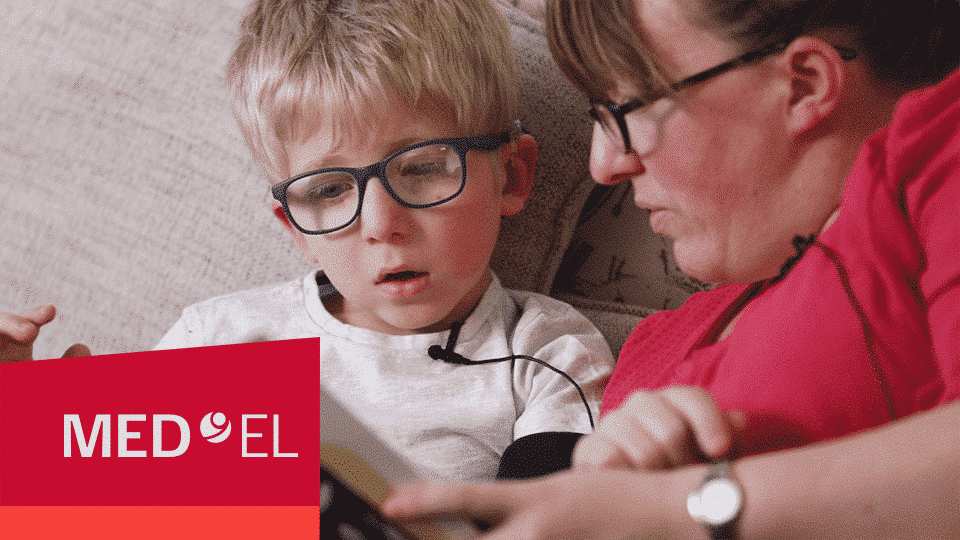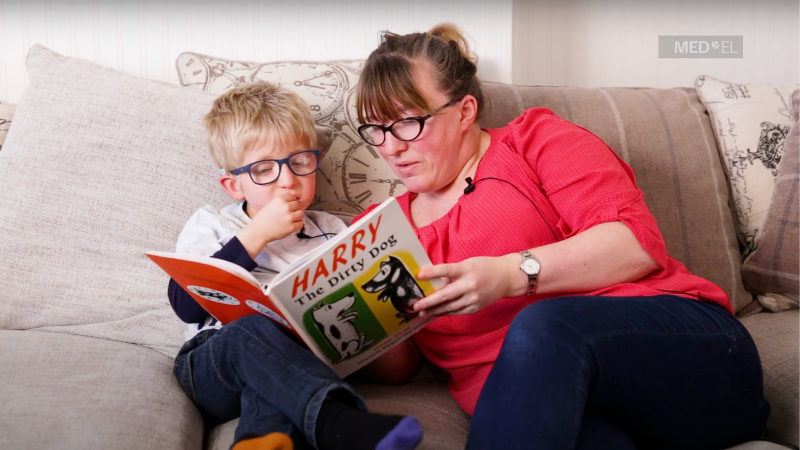
MED-EL
Published Mar 20, 2019 | Last Update Aug 26, 2024
Rehab At Home: What Is “Expansion and Extension”?
“Expansion and Extension“ is another strategy you can use at home with your child to develop their use of spoken language. If your child is using single words, short phrases or sentences, the use of this technique can encourage them to use longer phases/sentences and more complex vocabulary.

Why Is “Expansion and Extension” Important?
“Expansion and Extension“ is a natural way to develop your child’s vocabulary and use of spoken language. A typically hearing child learns many words through overhearing the more complex conversations going on around them. Children with hearing loss may miss out on this information. “Expansion and Extension“ is one way that you can provide your child with more complex language in an interesting and natural way.
How Can I use “Expansion and Extension” with my child?
When playing and talking with your child, listen out for the words or phrases your child is using. Then
- Expand what they have said by making their phrase grammatically correct. For example, if your child says “cat eat”, you could say “Yes, the cat is eating”. You have acknowledged what your child has said and provided the correct “adult” sentence.
Or you can
- Extend what your child said by making their phrase grammatically correct and adding more information. For example, if your child says “Daddy go”, you could say “Daddy is going to work”.
Remember to do so in a conversational tone, rather than correcting your child or expecting them to repeat your phrase.
By expanding and extending your child’s phrases like this, you can model the correct sentence forms, and add more complex words or language, while your child is focused with you on a fun activity.
Matthew’s mum does a great job expanding on and extending Matthew’s phrases in this video. She says his phrases back to him with the correct grammar, and then adds more information.
Here are some other ideas for using “Expansion and Extension” with your child.
What Activities Can We Do With Younger Children?
- At meal times, encourage your child to request their needs. If you child says “drink”, you can expand this by saying “a drink please”. Or extend this by saying “A drink of water please”.
- When getting dressed, if your child says “sock”, expand and extend this by saying “Yes, put the socks on”.
- Think about how you can extend your child’s phrases by adding information about:
-
-
-
- Prepositions e.g. ‘through’, ‘before’, ‘after’, ‘then’
- Thoughts e.g. ‘remember’, ‘expected’, ‘wonder’
- Emotions e.g. ‘surprised’, ‘worried’, ‘disappointed’
- Conjunctions e.g. ‘because’, ‘if’, ‘but’
-
-
What Activities Can We Do With Older Children?
- When talking about your day together, if you child says “I go park”, you can expand and extend this by saying “You went to the park with Grandpa”.
- When driving in the car and talking about what you can see, if you child says “big truck”, you can expand and extend this by saying “I can see a big truck. It has cows in the back”.
- Listen out for grammatical markers in your child’s sentences such as ‘a’, ‘the’, ‘is’, ‘are’, plural ‘s’ as in “cats”, and tense markers as in “jumping” and “jumped”. If your child is not using these yet, expand their sentences so that they hear how they should be used in conversation.
- Think about how you can extend your child’s phrases by adding more complex words such as:
-
-
-
- Prepositions e.g. ‘through’, ‘before’, ‘after’, ‘then’
- Thoughts e.g. ‘remember’, ‘expected’, ‘wonder’
- Emotions e.g. ‘surprised’, ‘worried’, ‘disappointed’
- Conjunctions e.g. ‘because’, ‘if’, ‘but’
-
-
Interested in more from Rehab At Home? Check out all the videos on our Rehab At Home page.
Find out more about how cochlear implants work and how they could help you or your child.
References

MED-EL
Was this article helpful?
Thanks for your feedback.
Sign up for newsletter below for more.
Thanks for your feedback.
Please leave your message below.
Thanks for your message. We will reply as soon as possible.
Send us a message
Field is required
John Doe
Field is required
name@mail.com
Field is required
What do you think?
© MED-EL Medical Electronics. All rights reserved. The content on this website is for general informational purposes only and should not be taken as medical advice. Contact your doctor or hearing specialist to learn what type of hearing solution suits your specific needs. Not all products, features, or indications are approved in all countries.

MED-EL

MED-EL



